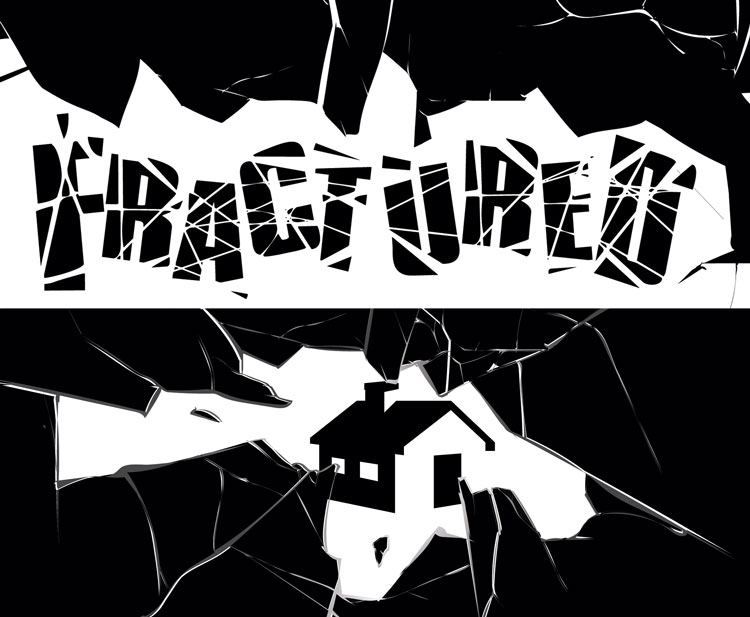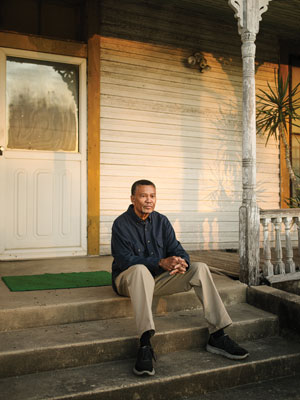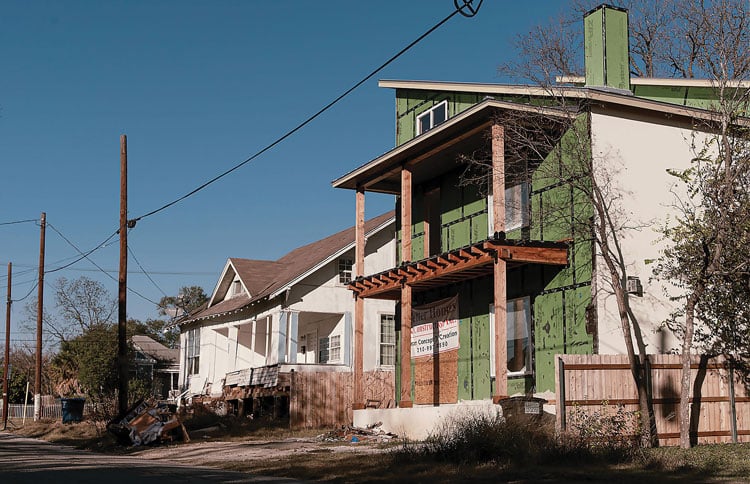How Jim Crow-era laws still tear families from their homes

Illustration by Brenan Sharp/ABA Journal
Back in the late 1990s, Thomas Mitchell was an LLM student at the University of Wisconsin Law School researching land law policy when almost by accident, he stumbled across a little-known legal loophole that had stripped generations of Americans of their land.
Mitchell was volunteering for a legal organization and observing a meeting of Black farmers in a hotel conference room in Durham, North Carolina. They were engaged in a heated discussion about the class action settlement in Pigford v. Glickman, a case filed in 1997 against the U.S. Department of Agriculture alleging discriminatory lending that resulted in a consent decree awarding more than $1 billion to thousands of Black farmers. It was the largest civil rights settlement in U.S. history.

Ronald Henry: “Right now, this is what they call a ‘hot’ area. All the developers want to buy in this area, and they’re like vultures.” Photos by Josh Huskin/ABA Journal.
At the meeting, someone identified Mitchell as a lawyer. Before long, several people had regaled him with tales of how they had been stripped of the land they had inherited.
Two members of the same family explained how they had lost about 200 acres after another relative with a small stake had sold their share to a speculator who forced a partition sale. The land had been in the family since the late 1800s.
At first, Mitchell dismissed what he was hearing as a lack of sophistication about how the legal system works.
“What they had just described to me, I had never heard it before when I was in law school. No property textbook guide talked about the process working out that way,” Mitchell remembers.
His interest, however, was piqued. He politely promised to look into the matter, but when his research came up short, Mitchell contacted the family and asked to see the court records in their case.
He was stunned to discover the documents mirrored exactly what they had told him.
“It was like a fire sale,” says Mitchell, now a Texas A&M University School of Law professor who received a John D. and Catherine T. MacArthur Foundation “genius grant” in 2020 for his work in property law.

Older family homes make way for new construction in Ronald Henry’s San Antonio neighborhood. Photos by Josh Huskin/ABA Journal.
At first, Mitchell thought the family’s case might be the exception rather than the rule. Then he started looking at laws in all 50 states and realized he had just scratched the surface. The case was the catalyst for his effort to spotlight an inequity in property law that strips landowners, often the poor and people of color, of their equity and wealth. Heirs’ property ownership, a subset of tenancy-in-common ownership, affects owners who share an interest in land, a home or a farm that is often transferred without an effective deed or will.

Ronald Henry has been living in the Henry family home since 1978. Photos by Josh Huskin/ABA Journal.
Heirs’ property is considered a vestige of the Jim Crow South, where unsophisticated property owners without the means or ability to hire a lawyer—or with a justifiable distrust of the courts—divvied up their assets informally, creating “interests” for descendants.
Regressive laws allow speculators to swoop in, exploit fraught family dynamics and fractionalize shared ownership through forced partition sales, divesting generations from lawfully owned property.
“The original sin is many of these families, when they first got the property in the late 1800s, tried to get a lawyer, but no lawyer would represent them,” explains Mitchell, who has been the driving force for heirs’ property reform as principal drafter of the Uniform Partition of Heirs Property Act, which offers greater protections to land and property owners entangled in court-ordered sales. “As a result, they fell into this heirs’ property, which I almost think of as a Jim Crow form of ownership, and now they’re trapped in it because they couldn’t get 99% of their family to agree. I just think that’s fundamentally unfair.”
Struggling to stay in their homes
There has been a landslide of property loss in the Black community since Reconstruction through violence, threats and intimidation, discriminatory lending, foreclosures, tax sales and legally sanctioned takings.
From farmland in the Mississippi Delta to beaches on the Southeast coast, researchers estimate the value of wealth lost by Black property owners is in the billions of dollars, with millions of acres dispossessed.
Heirs’ property auctions have contributed to the racial wealth gap, particularly for Black landowners in rural communities. But people of color living in cities are just as vulnerable to forced partition sales if they hold a fractional interest through a tenancy-in-common ownership structure, which Mitchell says is inherently unstable.
Ronald Henry can attest to that. The 69-year-old African American homeowner says he was blindsided when a letter came in the mail detailing how a trust had purchased half an interest in his single-family home in San Antonio, where he has lived since 1978.
Henry soon discovered his brother, Jesse Henry, whom he hadn’t seen in close to 10 years, had sold his 50% share in the house to an investor, identified in court records as the San Antonio Arts and Entertainment Revocable Trust. Soon the trust claimed the right to charge him $375 a month for living in his own home, and then it filed a partition action asking for the house to be sold.
“Evidently, they had got a sweet deal. Maybe they got it for a little bit of nothing from him,” Henry says of his brother. “They probably figured they could bully me into selling the other half.”
Henry doesn’t want to sell and hopes to hand down the home to his son Kirk and 12-year-old granddaughter. He has witnessed his neighborhood transform over the years from a majority Black neighborhood that he estimates is now 50% white and 40% Hispanic. As the demographics shifted, he says, investors moved in. Henry lives off $1,000 per month in retirement benefits and felt he didn’t have the means to hire a lawyer to fight back.
“Right now, this is what they call a ‘hot’ area. All the developers want to buy in this area, and they’re like vultures,” Henry says. “In other words, they’re running over each other trying to get property, lots, houses.”
Scott Kohanowski, director of the Homeowner Stability Project with the City Bar Justice Center in New York City, has seen predatory investors and developers look for properties in gentrifying parts of the city to force partition sales. Investors often prey on homes in Black or Latino neighborhoods that have been historically undervalued because of redlining and discriminatory lending. “Fast forward 30 or 40 years, and those neighborhoods have gentrified, and those properties are now worth $1 million or $2 million,” Kohanowski says.
In August, Kohanowski met with a 60-year-old woman who was close to being forced out of her multiunit apartment building in Brooklyn’s Clinton Hill neighborhood that had been in her family for 40 years.
Kohanowski says a “vulture investor” swooped in to take a majority 70% interest in the property by buying out two sisters who no longer lived there.
Kohanowski says New York’s original partition law is harsh, allowing the investor to charge the woman and her family rent without crediting them for their mortgage payments and repairs.
“The end result is the vulture investor stands to gain a significant advantage in his small investment, stripping the equity from the home and displacing about a dozen heirs,” Kohanowski says.
What the developer did in her case was not unlawful, Kohanowski explains. When multiple heirs hold a part interest in a home through tenancy-in-common ownership, investors can buy out a minority or majority interest and use it to force a partition sale, even if a family has occupied the home for generations.
In 2019, local cable news channel Spectrum News NY1 investigated how developers were taking advantage of Black tenancy-in-common owners in gentrifying areas of the city. In response, New York state passed the Uniform Partition of Heirs Property Act, which gives homeowners the right of first refusal and the opportunity to buy out co-tenants who force a court-ordered sale. If a sale must go ahead, then an open-market sale is preferred over a sale at auction.
Even with the protections of the Uniform Partition of Heirs Property Act, the cases are complicated because it’s not always possible to divide parts of an inherited home in the same way multiple owners could divvy up land.
Texas Gov. Greg Abbott signed the same legislation into law in 2018. But Henry still risks losing the family home. His house on South Olive Street is in an area close to downtown San Antonio and was passed down from his grandparents to his mother, Felma, who then deeded the property to Henry, his brother Jesse and sisters Barbara and Janelle. The sisters later transferred their interest in the home to Ronald and his brother, according to Henry.
Eventually, Henry went to Texas RioGrande Legal Aid for help. Staff attorney Lizbeth Parra-Davila took on his case. She says Henry’s home is his greatest asset and his only source of wealth. Parra-Davila says when she first talked to Henry, he thought he was being scammed. His confusion turned to anger when he learned that the trust had bought half an interest in his house.

Lizbeth Parra-Davila: “It’s just egregious that Mr. Henry, who is at risk of being homeless, was preyed upon by this investor-developer.” Photos by Josh Huskin/ABA Journal.
“It’s just egregious that Mr. Henry, who is at risk of being homeless, was preyed upon by this investor-developer, who was really only trying to make a profit out of this home located in a very desirable area of the city,” Parra- Davila says.
Daniel Burke, an attorney for the San Antonio Arts and Entertainment Revocable Trust, declined to comment on specific claims in Henry’s case but says more will be revealed in court.
“I understand that Mr. Henry is probably saying, ‘This bad person bought my brother’s interest in the house, and they’re going to want to kick me out on the street forever and ever,’” Burke says. “There’s always two sides to the story.”
In its partition action, the trust says “despite plaintiff’s multiple and best efforts, the parties have been unable to reach an amicable resolution,” and it was forced to take legal action because Henry has allowed the house to fall into a state of disrepair.
Henry’s grandmother bought the home for $2,000, and he has lived there more than 40 years. He admits the house, a tumbledown single-story with a buckling front porch, is in “bad shape.” He suspects the trust is more interested in tearing it down and making use of the land, perhaps to build condominiums. He has not had his home appraised but says that a lot across the street sold for $75,000.
In court filings, Henry says he has paid almost $13,000 in property taxes in the past two decades, and $35,000 on upkeep, including repairs to the roof and main sewage lines. Henry also accused the trust of common-law fraud for claiming it has the right to collect rent from him.
“All I want to do is just live the rest of my days in peace,” Henry says. “I’m not interested in selling. You could probably talk to most of the senior citizens in this area. They’re not interested.”
A fight on many fronts
Attorney Tina Nelson works on probate cases for the AARP’s Legal Counsel for the Elderly in Washington, D.C. She says clients who live in gentrifying areas of the district are vulnerable to losing homes that may have been in their families for generations.

Photo of Tina Nelson courtesy of Legal Counsel for the Elderly.
Nelson testified before the Council of the District of Columbia as it considered adopting a version of the Uniform Partition of Heirs Property Act in 2017. The bill failed that time around, but Nelson hopes the district will eventually adopt the law.
“To keep what you own in the family and preserve that wealth for the next generation is of utmost importance, especially for communities of color,” Nelson says.
She adds that elderly homeowners in the district are often unable to take advantage of homestead exemption deductions because that relief is only available to those with a deed. Without the exemption, property taxes can overwhelm homeowners in gentrifying neighborhoods, Nelson explains.
Attorney Kelley Austin helps her indigent clients in rural Texas avoid land loss and keep wealth in their families through a project at the Earl Carl Institute for Legal & Social Policy at Texas Southern University’s Thurgood Marshall School of Law.
The project’s efforts are not always successful and reveal the uphill battle many face in securing land they inherited.
Austin says that in 2009, the project had a client in her late 70s who wanted to buy out her relatives because she was paying all the property taxes and expenses associated with more than 33 acres of land in Montgomery County, about 40 miles north of Houston.
According to Austin, the woman wanted to hand down the land to her daughter when she died and knew it was valuable because someone had offered $400,000 for 5.57 acres.
The woman was one of 14 siblings with a claim to the land after her father died. The elderly client was forced to file a partition action after unsuccessfully trying to negotiate with her siblings. During the course of the litigation, the project uncovered almost 900 heirs.
Austin says the case was a huge undertaking and dragged on for 10 years. Just when it looked like the woman was about to settle the case, she died, leaving the matter unresolved. The case illustrates how fractionalized ownership of land can deprive a family of generational wealth, Austin says.
A national push for reform
Heirs’ property ownership in urban areas of the country dates back to the mid-1900s and to the late 1800s in rural America, according to Mitchell.
Generations of African Americans lost their homes through forced partition sales, but there was no meaningful reform until 2010, when the Uniform Law Commission adopted the Uniform Partition of Heirs Property Act.
Mitchell proposed the law to curtail partition law abuses that robbed the disadvantaged of millions of acres of land and property. Mitchell worked together with the ABA Real Property, Trust and Estate Law Section to urge the Uniform Law Commission to adopt it.
Mitchell says it took a long time for people to take his work seriously since previous efforts at reform had failed. But his work got a major boost in 2001 when the Associated Press published a series called “Torn From the Land” that detailed how white Americans had stolen property and land from Black people through intimidation and violence. The investigative reporters behind the series needed an expert to talk to about partition actions in the rural South and called Mitchell.
“That changed my status within the world of law schools because all of a sudden, I was getting this outside validation,” Mitchell says.
The AP series prompted the ABA to create a task force that would go on to submit the proposal on partition law reform to the Uniform Law Commission. The first state to adopt the Uniform Partition of Heirs Property Act was Nevada. Sixteen states and the U.S. Virgin Islands have enacted it since.
Next, Mitchell wants to unravel the convoluted form of ownership that thrust Henry and other homeowners into court battles to save their homes.

Thomas Mitchell: “The unanimity requirement is locking these families into this dysfunctional ownership structure.” Photo courtesy of the MacArthur Foundation.
Mitchell has asked the Uniform Law Commission to consider a new reform that would allow heirs to shift to a more stable form of ownership without the consent of all the owners who hold a fractional interest. At present, if someone wants to stabilize ownership through a limited liability company, for example, he or she may have to get dozens of people to agree, according to Mitchell.
“The unanimity requirement is locking these families into this dysfunctional ownership structure,” Mitchell says.
His proposal would require a lower percentage of owners to reach a consensus to change a property’s ownership structure. Mitchell has not established what the threshold percentage would be, but it would require the creation of a new law rather than amendments to the Uniform Partition of Heirs Property Act.
Heirs’ property disputes between families can still arise because of tenancy-in-common ownership, Mitchell says, even when the families have a deed or will but have estate plans that do not establish rights and responsibilities for heirs, such as who will be responsible for property taxes and upkeep.
Heather Way, a professor at the University of Texas at Austin School of Law, says there is a desperate need for legal services to help struggling homeowners engage in estate planning to establish clear titles and deeds.

Heather Way: “We need to address this issue head-on.” Photo by Brian Birzer.
“We need to address this issue head-on and need to make sure that everyone who is fortunate to have access to land and a home is able to maintain that access. Access to legal services is a big part of that,” Way says.
Kohanowski says it remains to be seen how effective the Uniform Partition of Heirs Property Act is in curtailing predatory developers and investors. He says homeowners are still vulnerable but that the law at least “levels the playing field” by giving heirs the right of first refusal and the chance to secure financing to buy out a competing interest. Kohanowski says the law in New York state also has an alternative dispute resolution component to help heirs settle disputes.
“My feeling is it’s going to discourage this sort of investment activity and give us more tools to preserve intergenerational wealth, especially in communities of color,” Kohanowski says.
This story was originally published in the Feb/March 2021 issue of the ABA Journal under the headline: “Fractured: How Jim Crow-era laws still tear families from their homes.”



